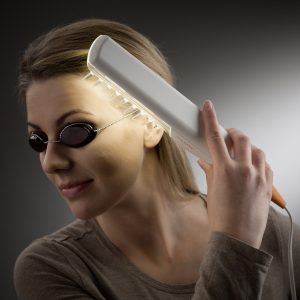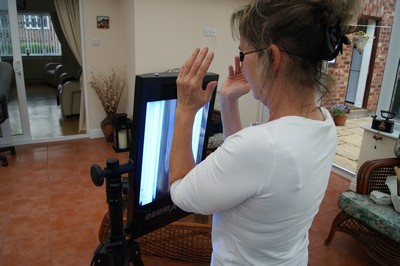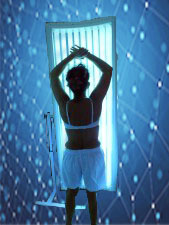UVB Light Therapy at Home
Investigating UVB Light Therapy At Home
If you are investigating UVB Light Therapy at Home, we would like to provide you with some details on the subject which will hopefully inform your discussions with medical professionals such as your doctor or dermatologist.
MBS have been the leading provider in the UK, of UVB Phototherapy devices for home use since 1996. UVB Light Therapy is an effective and well-established treatment for conditions such as Psoriasis, Vitiligo and Eczema. We have been helping customers to conveniently access the same therapy provided in Hospitals and Dermatology Centres in their own homes.
Narrowband UVB phototherapy is a well-established therapy, used within the NHS and by Dermatologists world-wide for treating a range of skin conditions including psoriasis, vitiligo and eczema.
Our Narrowband UVB devices provide sufferers the opportunity to access the same quality hospital therapy, conveniently and discretely at home.
UVB treatment at home has become a go-to method of treatment for many who have experienced the benefits of this therapy within the health service, but are deterred by the practical issues that arise whist undergoing treatment at a Hospital or Dermatology care centre. Our range of UVB units enable you to use Hospital technology at home. We use Philips 311nm UVB Narrowband Tubes in all of our units, offering our customers a specialist solution designed to treat Psoriasis and Vitiligo at home.
Narrowband technology ensures that the majority of UVB light emission is concentrated on the 311nm wavelength, allowing for targeted treatment of psoriasis and vitiligo. UVB light at 311nm is recognised as the most therapeutic wavelength for treatment of skin conditions and is why most hospitals and specialists clinics only use the Philips Narrowband TL01 311nm UVB tube.
But, before we dive into the specifics of UVB Phototherapy at Home, it’s important to qualify whether you might be a good candidate for UVB Phototherapy. We have listed the main criteria below.
- If your condition is not improving with the first-line treatments usually prescribed by your GP. These will be topical treatments, (creams, ointments and moisturisers), who’s effects are reviewed, usually after 6 months of treatment.
- If your condition is widespread, moderate to severe. Psoriasis used to be categorised based on body coverage. Mild Psoriasis was described where under 3% of the body was covered. Between 3% and 10% body coverage was moderate and over 10% was severe. As a rough guide, if both of your hands were the only parts of your body affected, you would probably fall into the moderate category.
- If your condition is having a significant impact on your physical, psychological or social wellbeing. You are not alone. These factors are now recognised as being so important, that the severity of your condition is categorised by your clinician using a DQLI (Dermatology Quality of Life Index) survey.
- If you or your partner are trying for (or even considering) conception. Some drugs commonly prescribed for Psoriasis (Methotrexate for example) are unsuitable in this scenario. Biologic drugs (another systemic treatment for Psoriasis) are rarely prescribed for pregnant or nursing women. Women prescribed Acitretin, (when Psoriasis is severe on the hands or feet), should not get pregnant whilst taking Acitretin or for 3 years after they stop.
- If you have experienced side effects with other treatments or drugs prescribed for Psoriasis, which are difficult to tolerate.
- If your current prescribed medication is no longer effective in clearing your condition.
If one of these scenarios affects your treatment, your Dermatologist may well have already referred you, (via the NHS or privately), for UVB Light Treatment at a Dermatology Centre.
Why choose UVB Light Therapy at Home?
UV Phototherapy is offered for free on the NHS so why do you need UVB Light Therapy at Home?
Read on for a comparison of Light Therapy in the NHS vs Light therapy at Home.
n-UVB Phototherapy is an incredibly effective treatment for Psoriasis, Vitiligo and other conditions that respond to the therapeutic effects of narrowband UVB light. However, for the treatment to work effectively, the treatment regime must be followed meticulously for a period of up to 10 weeks.
In practice, the treatment involves very short exposure to n-UVB light, (between 30 seconds and 4 minutes maximum), every other day between 3 & 4 times per week.
Contrasting treatment at home with treatment at a hospital or dermatology centre a number of practical issues arise.
In the NHS
Your first hurdle will be the waiting time before you actually receive treatment. This maybe up to two years (as of Spring 2024).
By way of example, let me describe this process.
For most Psoriasis sufferers, if you are lucky and have a good relationship with your GP, your GP will follow NICE (National Institute for Health and Care Excellence – The UK body who recommend best practice for Medical Practitioners) guidance on assessment and treatment.
Your GP will endeavour to improve your condition with Topical creams, Ointments or Steroidal creams. This part of the process may take a long time, (between 6 weeks and 6 months or longer), as the practitioner tries different treatments, possibly with breaks in-between treatments.
If your condition does not improve or deteriorates, your GP will refer you to a Dermatologist. The wait time before seeing a Dermatologist, is at best, around 6 weeks and can be up to 6 months.
When you finally see the Dermatologist, they will commonly refer you for Phototherapy, but the waiting lists for Phototherapy treatment currently run between 6 months and 2 years.
Many customers come to us because they have been stuck in this process for years and are still waiting for Phototherapy treatment.
Once you overcome this initial hurdle, the health service recognises that attending an appointment 4 times per week for 8 weeks is not practical for most people. Consequently, most people are offered 2 appointments per week, (3 at most). Even with just two appointments a week this can be difficult schedule to adhere to, from a purely practical perspective, if you have a busy life or a job. Consider the following
- The amount of time that you need to attend the appointment.
- Can you take that much time off work? Do you want to have that conversation with your boss?
- Can you fit the treatment into your schedule?
- The distance you live from the treatment centre.
- The costs involved in getting to your appointments, commuting and/or parking
For the therapy to be effective, continuity is critical. If you miss more than 2 consecutive appointments, some Health trusts will bounce you back to the bottom of the waiting list for treatment. Currently, (March 2024), waiting lists for light therapy are between 6 months and up to 2 years in some NHS Trusts.
vs. UVB Light Treatment at Home
Unless you have previously had UVB phototherapy and know that it works for you, the initial consultation with a Dermatologist is imperative and unavoidable. No difference there, but we can offer a couple of suggestions that may help.
If you aren’t lucky enough to have private medical cover or cannot afford to pay for a private consultation, our advice would be to engage with your GP to try and get a referral to a Dermatologist as quickly as possible. Lots of people don’t stay on top of this follow up process and as a consequence it can drag on much longer than it needs to before your GP refers you to a Dermatologist.
If you are lucky enough to have private medical cover or can afford to pay for a private consultation with a Dermatologist, we would strongly recommend that you arrange for an initial consultation (around £250). Even if you cannot afford Private treatment, you will at least have had an expert consultation on your condition with the Dermatologist providing a clear idea of what treatment you will require. Many customers do ask for recommendations and we can help depending on where you are in the Country. We can recommend Consultants in Manchester, Newcastle, London and a Harley Street Dermatology Practice.
Contrasting NHS Phototherapy treatment appointments with UVB Phototherapy at home.
- If you have a n-UVB phototherapy device at home, treating yourself 4 times per week becomes very simple.
- You do not need to allocate any time for the treatment. You can integrate your 30 second – 4-minute exposure in your daily schedule, after a shower in the morning or your bath at night.
- No time off work. No awkward conversation regarding your condition.
- No problem sticking to the treatment schedule. You only have to find a spare 4 minutes somewhere in your day.
- No travelling to a treatment centre.
- No costs associated with attending a hospital appointment.
- UVB Light treatment at home puts you permanently at the front of the queue for treatment.
- If you miss a few sessions – Not a problem, just restart the course!
- If your Psoriasis flares up – You can treat yourself immediately!
- You can take control of the management of your condition!
- Knowing that you can control your condition reduces the amount of stress associated with a flare. This can break the vicious circle where stressing exacerbates Psoriasis.
If you’re looking for the best light therapy at home, our specialist units offer solutions which will provide the appropriate phototherapy treatment for your condition.
Please note: Our company only faces competition in the small hand held device market. Our competitors (Chinese and Eastern European) often imply that their products are suitable for treating large areas or even the whole body. These devices have a small light face and are not designed to treat large areas. There is a significant danger of overexposure if you attempt to treat large areas of skin with devices that are this small. Please do call us before buying as we would rather you make an informed decision, than the wrong choice.
Whether you’re looking for a hospital style full body cabinet, a full body canopy (our most popular unit for moderate to severe conditions), or a unit more appropriate for targeted areas, we offer Pre-sales advice and Post-sales support to assist your choice of the right product for your condition.
Contact us today to discuss your specific requirements, and our team of professionals will be happy to advise you on the perfect unit.
To get an idea of how we treat our customers, take a look at the independent Google reviews on our Google Business Page
- We are available via phone on 01925 694280 or email sales@treatpsoriasistl01uvblamps.co.uk to discuss any questions you may have.
- We are happy to talk to your Dermatologist or Doctor if you prefer.
- Our aim is to offer a personalised service to try and offer advice on the most appropriate device for your condition.
- Please be patient with us, if your phone call is not answered, we are most likely speaking with another customer (most of our calls are quite lengthy).
- We guarantee that if you leave us a message with your phone number or email us, we will contact you as soon as possible.


